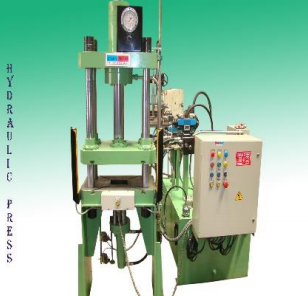Abrasive Hydraulic Press Machine
Abrasive hydraulic press machines are specialized industrial tools designed for pressing, molding, and compacting abrasive materials used in various manufacturing processes. These machines are essential in industries where precise shaping, density control, and uniformity of abrasive products, such as grinding wheels, cutting tools, and polishing stones, are critical. The manufacturing of abrasive hydraulic press machines requires a blend of advanced engineering, robust materials, and state-of-the-art technology to ensure optimal performance, durability, and safety.
The process of manufacturing an abrasive hydraulic press machine begins with meticulous design planning, where engineers evaluate the specific requirements of the end-users, including the type of abrasive material, desired pressure levels, and the operational environment. The design phase is crucial as it determines the machine's capacity to handle high-pressure applications while maintaining accuracy and consistency. Advanced computer-aided design (CAD) software is often employed to create detailed blueprints and simulate the machine's performance under various conditions.
Once the design is finalized, the manufacturing process proceeds with the selection of high-quality materials. The frame of the machine, typically constructed from heavy-duty steel or cast iron, is fabricated to withstand the immense pressures exerted during operation. The hydraulic system, the heart of the press, is carefully assembled using precision-engineered components, including pumps, cylinders, valves, and hoses. These components must be capable of delivering consistent and controlled pressure, ensuring that the abrasive materials are compacted with the desired density and strength.
The assembly of the abrasive hydraulic press machine is a highly specialized process, requiring skilled technicians to integrate the hydraulic system, electrical controls, and safety mechanisms. The hydraulic system is meticulously calibrated to achieve the precise pressure settings needed for different abrasive materials. Simultaneously, the electrical control system is programmed to automate the press operation, allowing for easy adjustment of pressure levels, cycle times, and other parameters. Safety features, such as emergency stop buttons, pressure relief valves, and safety interlocks, are also incorporated to protect operators and prevent accidents.
Quality control is a critical aspect of the manufacturing process, with each machine undergoing rigorous testing before it is deemed ready for shipment. These tests include pressure calibration, load testing, and operational trials to ensure that the machine meets the highest standards of performance and reliability. The final product is a robust, high-performance abrasive hydraulic press machine capable of producing high-quality abrasive products with precision and efficiency.
In conclusion, the manufacture of abrasive hydraulic press machines is a complex and highly technical process that demands a deep understanding of materials science, hydraulics, and industrial engineering. These machines play a vital role in the production of abrasive products used across various industries, contributing to the efficiency and effectiveness of manufacturing operations worldwide. With continuous advancements in technology, manufacturers are able to produce increasingly sophisticated and reliable hydraulic press machines, meeting the ever-evolving demands of the global market.

